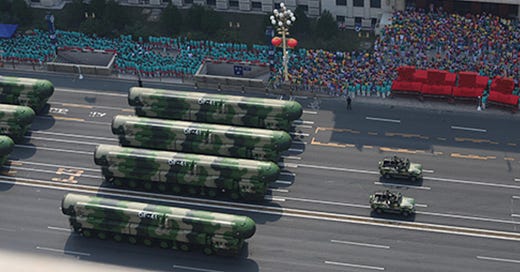Canada should learn from "unprecedented" Chinese interference in Taiwan's election
Ambassador Harry Tseng told reporters Xi Jinping's regime is increasingly aggressive and troubled from within

Reports of President Xi Jinping’s growing purge of senior officials from China’s elite Rocket Force indicate Xi is facing mounting rebellions within the Chinese Communist Party, Taiwan’s senior diplomat in Ottawa said Tuesday.
Harry Tseng, formerly a top national security official for Taiwan, addressed a range of issues with Canadian reporters in the wake of Taiwan’s presidential election.
The incumbent DPP’s pro-sovereignty candidate Lai Ching-te won with 40 percent of the vote, but opposition parties favoured by Beijing gained seats in legislature.
“This election, Chinese interference was unprecedented,” Tseng told reporters, adding that Canada should learn from Taiwan’s experience in countering China’s election meddling.
“There is a lack of understanding in Canada of Taiwan as a democracy, and there’s even more lack of knowledge of what China is about,” Tseng said. “This is going to backfire on you. If you are hoping to cooperate with China, just how many lessons do you need to see?”
Taiwan recognized during its 2018 election that Chinese Communist interference was rapidly escalating and Beijing was “reaping the benefits of cognitive warfare to divide our society,” Tseng said.
In response, Taiwan’s legislature quickly acted, passing its new Anti-Infiltration Act in 2019.
Among a range of clearly defined crimes, this counter-interference law says that any person intervening for “foreign hostile forces” in Taiwan’s elections — including making political donations at the direction of foreign entities — can be jailed for up to five years.
Meanwhile, Taiwan learned much of Beijing’s interference comes through manipulation and funding of media entities tasked to disseminate sophisticated disinformation.
Tseng said Taiwan has found that Beijing plants media companies that initially report on news and social matters just like credible websites do, in order to gain followers.
But these sites are later weaponized to post “fake news” and sew confusion in elections and national security matters.
This past election Beijing’s psychological warfare reached a new level of technological mastery, Tseng said. He cited examples including spreading of a “deep fake” video which saw Lai — the presidential candidate China tried to defeat — “claiming the opposition (party) represents the majority view.”
Websites funded and controlled by China also use artificial intelligence and chatbots to spread disinformation virally, Tseng said, such as a claim the U.S. government had ordered Taiwan’s military to produce biological weapons.
Beijing’s efforts were not futile but Taiwan’s democracy proved remarkably resilient, and the election was deemed to be free and fair, Tseng said.
This is partly because during the past five years Taiwan’s various ministries have learned to work seamlessly with its intelligence agencies to rapidly counter Beijing’s narratives with facts.




